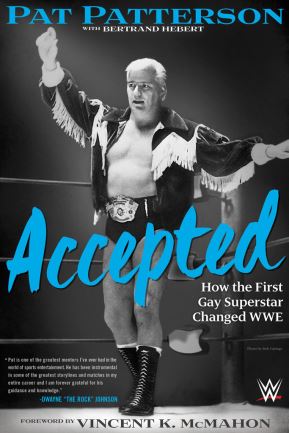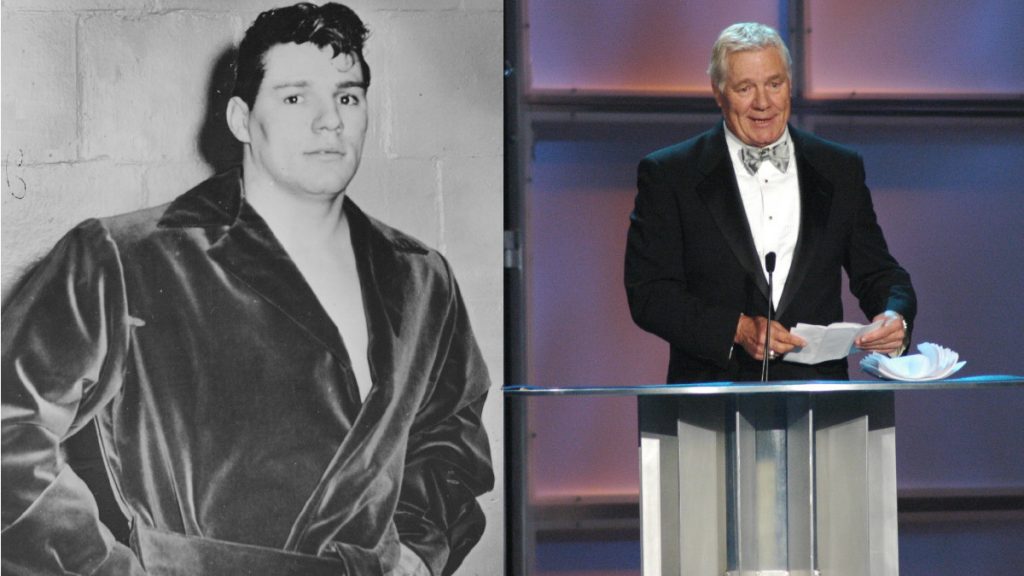There are few men as important to the professional wrestling business as Pat Patterson. In every single regard, he is a towering titan of the industry. From being the heir to Ray Stevens’ throne in Northern California, where he established himself as one of the most respected and best drawing workers of all time, to one of the key architects of the WWF as it established its dominance not only in the industry, but within the world of entertainment, as a whole. Professional wrestling today simply would not be the same without Patterson.
I never imagined, in my wildest dreams, that Patterson would actually pen his autobiography. Now that wish — and the wish of many around the world — has become a reality, in the form of Accepted: How the First Gay Superstar Changed WWE. And it does not let you down.

From surviving extreme poverty, language barriers, social intolerance, health scares, insane work pressures and other challenges that most human beings couldn’t even begin to comprehend, Patterson did everything in this world he put his mind to. Truly, it’s hard to believe that one person accomplished all that he has … and he keeps on going. Patterson in an inspirational, ever-progressing entity, who shows little signs of slowing down. His sparkling exuberance, never-say-die attitude and incredible sense of humor keep him forever young.
One of his greatest strengths — one that obviously opened countless doors — is his genuine likeability. He’s an absolute charmer. Patterson is a prankster, raconteur, and the proverbial life of the party. His love of life and curiosity for the world has never wavered; as he has grown older, it has all clearly become more refined.
Patterson is able to balance his easy-going side with a more direct, business-like approach to certain aspects. Forthright in a perfectly accurate measure, with a solid grasp of the world around him, his words have gravity, backed up with decades upon decades of experience. When he speaks it’s like the words of a casual sage. Patterson paid his dues many times over — not a thing in this world was handed to him — and he has seen and done it all. Somehow, Patterson still remains humble about everything.
I never thought I would finish a wrestling book and feel like I had just read a love story, yet that’s precisely how it felt. Not merely a love story between Patterson and his long-time companion Louis Dondero, but a love story between Patterson and the wrestling business.
This book does a great deal to restore the legacy of Patterson. This cannot be overstated. Through ignorance, jealousy and hate, Patterson had become the punch line to jokes in many circles because of his homosexuality. By his own admission, he never felt he needed to do anything to circumvent this, knowing all of this was pure balderdash, but it had to hurt, and talking about this openly seems like both a relief and vindication.Because Patterson was (and is) an openly gay man in a position of power in a very homophobic world, in an even more homophobic business, he was subjected to all the innuendo and accusations one might suspect. With grace and good humor, Patterson lets this roll off his back. He admits to not being a saint (who is in the wrestling business?), but all the stories of him doing this, that and the other were greatly inflated.
Even if every one of the rumors were true, Patterson would not truly stand out in the wrestling business. After all, wrestling in the older days truly was the Wild West, where anything and everything was acceptable. The boys did anything they wanted, with reckless abandon. But Patterson has been historically used by the wrestling community as a way of deflecting their own indiscretions, all because he is high profile and gay. Even as I write it, the words seem preposterous, but that’s how it was for decades.
And yet Patterson achieved something that many in the wrestling world never could have achieved: a stable, loving relationship. In wrestling, this is the equivalent to winning the lottery. Dondero was in every possible way his soul mate. Dondero was loved and adored by everybody, and it was through their love for one another, paired with their amazing light and spirit, that many people who might otherwise reject homosexuals learned to accept people for who they really are.
And I think that’s why the title of the book, Accepted, is so fitting. We have finally gotten to a place in our culture where homosexuality is not viewed in a negative light, and a man like Patterson can openly discuss the full breadth of who he is in a public forum. And because he is able to speak so freely, it has destroyed many of the myths that followed him for the majority of his career, and people can finally acknowledge him for the worth that he possesses within the professional wrestling world.When Dondero died, after 40 years of them being together, something in Patterson was gone forever. This is the first time he has addressed his feelings so explicitly. You definitely feel the heartache on the written page, even in the words he doesn’t say. The book, too, seems to lose the same spirit and zeal it had while Dondero lived in its pages — proof of how important he truly was to the fabric of Patterson.
Wisely, Patterson and co-author Bertrand Hebert chose to work in an informal, conversational style that is very much in tune with how Patterson, himself, operates. I felt this gave an accurate stamp of the man. Anything else would have seemed forced or disingenuous. Within this framework, Patterson seems to open up more then he ever would have in the past. There’s an absolute ease of presentation, how it flows. Here, you really do feel as if you’re merely having a conversation with one of the greatest contributors to the professional wrestling universe.
Nothing smacks of embellishment in any way, because Patterson’s at that age where he doesn’t need to do things like that to satisfy his own ego. The true story is more remarkable than anything he could conjure up, anyhow!Yes, Patterson talks about wrestling, too, and he does so with his own typical flair. You will gain a better understanding of Vincent K. McMahon (who writes the foreword), as Pat details their close friendship and working relationship. You will get to love and appreciate Stevens even more than you already do. And you will get to see sides of people that you always thought you knew, such as the tenderness and loyalty of Maurice Vachon, who was one of Patterson’s biggest supporters and protectors. Truly, there were some eye-opening revelations presented here.
The problem with a book like this is Patterson’s tale is so amazing and diverse, he cannot possibly cover the entire journey in one book. For example, you want to spend more time with him during his amazing run in San Francisco, which defined his career and entire future. You want to learn more about the inner workings of the WWF as it took on the world and became the international entertainment juggernaut it is today. You want to learn more about his friendships with some of the most famous names in the world. The book leaves you thirsting for more. And yet, by his own admission, Patterson has no desire to ever repeat the process. (He might be employing an old entertainment maxim, to bow out while you’re still in demand, to keep the world wanting you.)
I was already a big Patterson fan, since I grew up in the Bay Area, but now I have even more to like about him.
If you love professional wrestling, and truly care about its history and inner workings, this book is mandatory reading. Patterson is simply one of the greatest of all time, and this book is a gateway into his amazing world.
RELATED LINK
